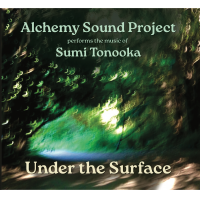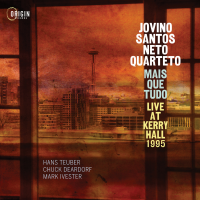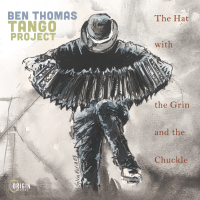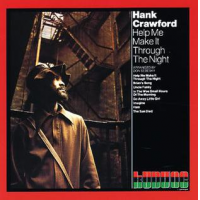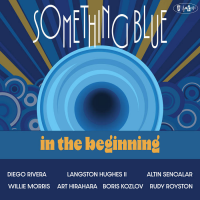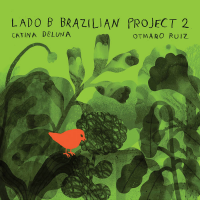Home » Jazz Articles » Liner Notes » Conrad Herwig: A Voice Through the Door
Conrad Herwig: A Voice Through the Door
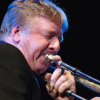
Conrad Herwig
tromboneb.1959
At this point in his career, Herwig does not lack for opportunities to play music and work with some of the greatest musicians in the world. As he prepared to talk with this writer about the album at hand, the trombonist had just finished several projects, including a new entry to his "The Latin Side" series, this time featuring the music of Joe Henderson. He had also come off a European tour with Eddie Palmieri and was prepping to head back overseas with the Latin icon for a few more dates. Add to this his third Grammy nomination for The Latin Side of

Wayne Shorter
saxophone1933 - 2023
"When I was thinking of putting this album together, it happened to coincide with the fact that

Joe Henderson
saxophone1937 - 2001
Those who have closely followed Herwig's career know that he enjoys classic literature and poetry. On a previous work, Obligation (Criss 1268), Conrad tapped into the writings of Chilean author and Nobel Prize winner Pablo Neruda. His original, "The Blue Shore of Silence," is titled after a collection of Neruda's poems about the sea. This time around, Herwig has found meaning in the works of Rumi, the 13th century Persian Muslim poet and Sufi mystic. "A lot of the titles are based off of the poetry of Rumi," explains Conrad. "He's become one of the most popular poets on the planet," he adds.
Herwig is especially drawn to the way Rumi looks at the duality of life and the simplest of small wonders. In fact, he feels that the interplay and counterpoint between the tenor sax and trombone is a musical reflection of the archetypal yin and yang. "It's [also] the concept of how people take for granted the simple things in life and I think it can be the same in jazz," Herwig explains. "For instance, when we're playing, there are a lot of subtleties in the music and there was something that seemed to be resonating with me in those poems."
So with his intents firmly established, Herwig went about writing the music and putting together his cohorts. "There's a real camaraderie and a sense of trust with this group of musicians and so it's incredible to put them together and to record," Herwig says. "It's a family affair because we've all known each other for so long and we've all played in different combinations together, so it feels organic and relaxed to play the music."
In the case of saxophonist

Ralph Bowen
saxophone
Ralph Peterson
drums1962 - 2021
Another Criss Cross veteran with his own musically divergent oeuvre is

Orrin Evans
pianob.1975

Sean Jones
trumpetb.1978
As stated, there are deep ties shared by all the members of the quintet. For bassist

Kenny Davis
bassb.1961

Kevin Eubanks
guitarb.1957
When it comes to drummer

Donald Edwards
drums
Seamus Blake
saxophoneb.1970

Alex Sipiagin
trumpetb.1967

David Kikoski
pianob.1961

Boris Kozlov
bass, acousticb.1967
The program of Herwig originals is balanced by a sagacious new take on the iconic standard "All or Nothing at All." Out of the gate is "A Voice Through the Door," a piece that shares similarities with the classic "Invitation," one of Joe Henderson's favorite standards. Conrad, Ralph and Orrin get solo space and then share bars of eight with Edwards at the tune's conclusion.
"I really anticipated the interaction with the group so there are some intros and tags at the end where we are all playing off of each other," says Herwig in regards to the approach that marks "Traceless Moon" and several of the other pieces. Bowen takes one of his most fluid solos of the date and Davis is heard in a thematic statement that logically builds from a three note riff. A conclusion includes the collective banter that Herwig had alluded to earlier. As he explains, "Of course, everyone is taking their own individual solo, but one of the highlights of playing is that interaction where everyone is trading back and forth and taking it on home."
"The Sun Within" permeates optimism and suggests the potential that is within each one of us. "There's a lot of energy on that tune coming from a McCoy Tyner type of modal vibe. From a group point of view, we've played together so much that Donald is freed up and doesn't have to just play time. You can feel different metric modulations that allow us to play longer phrases over the top of the form." More collective interplay between Ralph and Conrad distinguishes the end of the tune.
As Conrad so succinctly puts it, "If The Sun Within" is hot, then "The Morning Shade" is cool and easy with a bossa feel." The piece also brings with it more inspired soloing from Bowen, Herwig, and Evans. "You know, when you put together an album, you look for contrasts and that's where this tune comes from. The Rumi poem [of the same title] is about finding peace and inner joy from simple things."
"Water Rising Into Mist" is a minor blues dedicated to

Elvin Jones
drums1927 - 2004
A slow ballad with a straight eighth note feel, "Thorn Witness" "comes from this post sixties form of harmonic language," according to Herwig. "The idea is that the thorn is closest to the rose and so the thorn is the witness. It's the duality theme that we've been talking about and so you have that interplay," he further explains. "It's coming from this post '60s harmonic language. What's integral to the whole concept of the record is the counterpoint between the saxophone and the trombone and vice versa."
Unlike the previous originals, the closing "Free Action Reaction" is more loosely structured, allowing the quintet even more room to interact without preset constrictions. "The theme for the album is this shared type of playing and I think this tune was the last one that I wrote before the record date. We were looking for something that we could burn on and have even more spontaneous interaction. It's not that the other tunes didn't have that. The difference is that there's no form over this tune, so you're just blowing over a pedal point."
As clich®¶ as it might seem, it occurred to this writer that the underlying theme to which Herwig's music aspires has something not only to do with those truths of life penned so long ago by Rumi, but also stated by pop culture icon Ferris Bueller. As he tells us, "Life moves pretty fast. If you don't stop and look around once in a while, you could miss it." Fortunately, artists such as Conrad Herwig are attuned to the things they see and hear around them. Speaking frankly, he says, "We write music because it's a fact that the tunes are in your head like an imprint. The only way to move forward musically is to finish them and record them and for them to have a life." Let us not miss the opportunity to look around and take in musical gifts such as Conrad's. The world would surely be a slighter place without them.
Liner Notes copyright ? 2025 C. Andrew Hovan.
A Voice Through the Door can be purchased here.
Contact C. Andrew Hovan at All About Jazz.
An avid audiophile and music collector, Chris Hovan is a Cleveland-based writer / photographer / musician.
Track Listing
A Voice Through The Door; Traceless Moon; The Sun Within; Morning Shade; Water Rising Into Mist; All Or Nothing At All; Thorn Witness; Free Action Reaction.
Personnel
Conrad Herwig
tromboneRalph Bowen
saxophoneOrrin Evans
pianoKenny Davis
bassDonald Edwards
drumsAlbum information
Title: A Voice Through the Door | Year Released: 2012 | Record Label: Criss Cross
Tags
Comments
PREVIOUS / NEXT
Conrad Herwig Concerts

Conrad Herwig Latin Side All Stars, Antoinette Montague,
New Brunswick Performing Arts CenterNew Brunswick, NJ
Support All About Jazz
 All About Jazz has been a pillar of jazz since 1995, championing it as an art form and, more importantly, supporting the musicians who make it. Our enduring commitment has made "AAJ" one of the most culturally important websites of its kind, read by hundreds of thousands of fans, musicians and industry figures every month.
All About Jazz has been a pillar of jazz since 1995, championing it as an art form and, more importantly, supporting the musicians who make it. Our enduring commitment has made "AAJ" one of the most culturally important websites of its kind, read by hundreds of thousands of fans, musicians and industry figures every month.





 Buy Now
Buy Now




